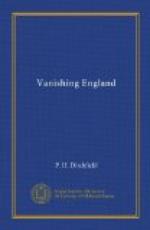The disastrous period of the Civil War and the Commonwealth caused great confusion and many defects in the registers. Very often the rector was turned out of his parish; the intruding minister, often an ignorant mechanic, cared naught for registers. Registrars were appointed in each parish who could scarcely sign their names, much less enter a baptism. Hence we find very frequent gaps in the books from 1643 to 1660. At Tarporley, Cheshire, there is a break from 1643 to 1648, upon which a sorrowful vicar remarks:—
“This Intermission hapned by reason
of the great wars obliterating
memorials, wasting fortunes, and slaughtering
persons of all
sorts.”
The Parliamentary soldiers amused themselves by tearing out the leaves in the registers for the years 1604 to the end of 1616 in the parish of Wimpole, Cambridgeshire.
There is a curious note in the register of Tunstall, Kent. There seems to have been a superfluity of members of the family of Pottman in this parish, and the clergyman appears to have been tired of recording their names in his books, and thus resolves:—
“1557 Mary Pottman nat.
& bapt. 15 Apr.
Mary Pottman n. & b. 29 Jan.
Mary Pottman sep. 22 Aug.
1567
From henceforw^{d} I omitt the Pottmans.”
Fire has played havoc with parish registers. The old register of Arborfield, Berkshire, was destroyed by a fire at the rectory. Those at Cottenham, Cambridgeshire, were burnt in a fire which consumed two-thirds of the town in 1676, and many others have shared the same fate. The Spaniards raided the coast of Cornwall in 1595 and burnt the church at Paul, when the registers perished in the conflagration.
Wanton destruction has caused the disappearance of many parish books. There was a parish clerk at Plungar in Leicestershire who combined his ecclesiastical duties with those of a grocer. He found the pages of the parish register very useful for wrapping up his groceries. The episcopal registry of Ely seems to have been plundered at some time of its treasures, as some one purchased a book entitled Registrum causarum Consistorii Eliensis de Tempore Domini Thome de Arundele Episcopi Eliensis, a large quarto, written on vellum, containing 162 double pages, which was purchased as waste paper at a grocer’s shop at Cambridge together with forty or fifty old books belonging to the registry of Ely. The early registers at Christ Church, Hampshire, were destroyed by a curate’s wife who had made kettle-holders of them, and would perhaps have consumed the whole parish archives in this homely fashion, had not the parish clerk, by a timely interference, rescued the remainder. One clergyman, being unable to transcribe certain entries which were required from his registers, cut them out and sent them by post; and an Essex clerk, not having ink and paper at hand for copying out an extract, calmly took out his pocket-knife and cut out two leaves, handing them to the applicant. Sixteen leaves of another old register were cut out by the clerk, who happened to be a tailor, in order to supply himself with measures. Tradesmen seem to have found these books very useful. The marriage register of Hanney, Berkshire, from 1754 to 1760 was lost, but later on discovered in a grocer’s shop.




